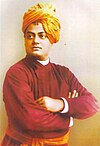Ram Chandra Datta
He invented an antidote for blood dysentery from an extract of an indigenous medicinal plant and started promoting "modern science".
His father Nrisimha Prasad Datta was a devotee of Hindu god Krishna and his mother Tulasimani was known for her generosity and kindness.
[1] Ram continued his education, in spite of several adversities, at the General Assembly's Institution (now Scottish Church College).
He invented an antidote for blood dysentery from an extract of an indigenous medicinal plant, which got the seal of approval from the government.
Leading doctors started prescribing it, and he became famous, and as a result he was appointed a member of the Chemist Association of England.
We were rank materialists, and we held the view that eating, sleeping, and creature comforts were the summum bommum of life."
He was also a good debater on subjects of God and religion and proved his atheistic views, and this attitude continued for five years.
[1] Then his young daughter died suddenly, which plunged him in immense grief and self-reflection and attitude towards God.
He tried to look for solace in the Brahmo, Christian, and Hindu religious faiths, but his "The great inquiry" of God did not seem to end.
This was the turning point in his life and he thereafter became a staunch devotee of Ramakrishna to the extent that he considered him as an Avatar of God and started propagating his message through lectures in later years.
At that time, Vivekananda tried to pacify the grieving disciples by narrating Ramakrishna's life events of mercy.
With his gift of spiritual knowledge that he had acquired under the Master, he turned an "evangelist" and he delivered 18 public lectures between 1893 and 1897 at the Star, City, and Minerva Theaters in Calcutta extolling Sri Ramakrishna's life and teachings.
In his official life, he exercised utmost discipline in his dealings with the public and suppliers that he refused to accept any kind of favour to overlook any lapses in standards of supplies and delivery.
Ram was so touched by this visit and kind gesture that his eyes watered and he emotionally stated: "Bille (Swami Vivekananda’s family nickname), I thought that after travelling to America and becoming famous you would have forgotten us.
Vivekananda had even threatened to take Ram Chandra to court if he attributed to his name in this book, which was known by the epithet "bosh and rot".


